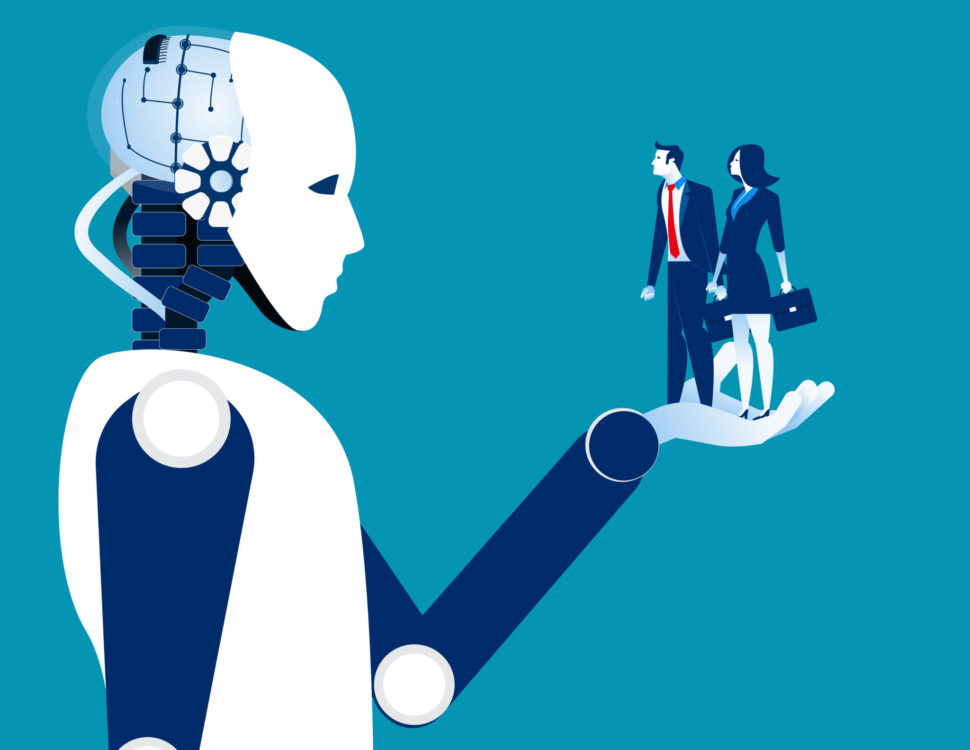In the past decade, AI quickly became a candidate for the most important technological development ever. In this AI 101 series, we break down the key topics involved in AI development.
Just over a century ago, Orville and Wilbur Wright built the first airplane. Fifty years later, we landed on the moon.
Today, practically every person in the developed world owns a handheld device capable of searching through practically the entirety of human knowledge.
In fifty years time, where will we be?
Read More: Magic Leap’s Mica is Not an AI Assistant, She’s an AI Replicant
The last century saw some significant and life-altering developments that fundamentally changed the way humans interact, grow, and survive. Our rate of advancement became so rapid that it’s difficult to really understand the scope of modern technology.
Practically every research field experienced phenomenal advances over the past number of years thanks to the growth of the Internet and an increasingly connected world.
In many aspects, we have surpassed science fiction. Space travel, holograms, hoverboards, self-driving cars, nanotechnology, and renewable energy are now the norm, pushing our ideas of humanity’s capabilities further than ever before.
One of humanity’s greatest strengths is our endemic drive to discover, be curious, and adapt to new situations. The curiosity that led to the creation of the first stone ax comes from the exact same source as a chemist with a microscope.
In short, it is our intelligence that we have to thank for our incredible advancements and developments as a species. We, as a society, take pride in being the smartest species on Earth. It’s such a fundamental part of our identity that it’s become a subconscious guarantee within our own psyche.
So, what would happen if we were no longer the most intelligent entity on Earth? How would that affect us on a social, psychological, and emotional level? Naturally, we know that there isn’t some kind of squirrel genius hiding out in the trees or a hyper-intelligent jellyfish lurking in the depths of the oceans, but that doesn’t mean it’s an impossibility.
Instead, our own intelligence may be overtaken by something of our own creation: AI.
Artificial Intelligence, or AI, is a buzzword in the modern media and business sphere. It’s become so prevalent in advertisements, products, and apps that sometimes it’s hard to define exactly what AI is. And, even if you did happen upon a convenient definition, there’s a strong argument that conventional AI isn’t “true AI” at all.
Aside from that, defining intelligence itself is a difficult prospect. I won’t attempt to do that here.
However, it’s a little easier to define AI. You could say that, in general, you can use the term AI to describe any program or software that has been developed or designed to perform a task that was once or could be performed by humans.
Put simply, any algorithm is artificial intelligence according to our current application.
While not a sentient being, Siri is an AI. So too is the autopilot in an airplane. A chess-playing robot is an AI just as much as the software used to drive an autonomous vehicle is. If an algorithm is an AI, then it follows that any set of algorithms built to act upon certain stimuli is also AI.
The fact that AI has become a common, largely meaningless term, is an incredible human achievement. If you took a person from the 1950s and handed them a smartphone, it’s likely that it would take them weeks, if not months, to fully understand the capabilities of what they held.
Back in those days, the doomsday threat of the Cold War was ever present. Military science has always been a primary catalyst for technological development, but we assert that it’s no coincidence smartphones developed during a relatively peaceful period.

Some of you might be thinking that there were plenty of people who were born in the 1950s who are alive and kicking today. That’s true, but they have watched AI and technology in general grow and develop, making it far easier for them to understand it and utilize it.
I like to think of this as the “Boiling Frog Effect”.
In it’s simpler terms, it’s the idea that watching something slowly develop and advance makes the achievement far less impressive or life-changing.
Even thinking about the capabilities of my dial-up connection of the past compared to the broadband I have today makes my head spin a little. We, as a species, are developing at an exponential rate. Our achievements have surpassed even that of science fiction and so, in turn, that of our own imaginations.
Read More: Will Machines Become Smarter Than Man?
We live in an incredibly rare time where we have absolutely no clue what the future may hold. And, nestled right in the center of this uncertainty, is AI.
The future of AI may entirely dictate the final outcome of our entire species, and it may do so in our lifetime.
The purpose of this AI 101 series is to try and discuss a few of the most important aspects of the future of AI and, in turn, ourselves.
In this first part of our series, I’ll discuss the most basic terms, possibilities, and theories about AI and where it may bring us. Let’s begin.
AI 101: Artificial Narrow Intelligence (ANI)

Artificial Narrow Intelligence, or ANI, is the type of AI which we have in our world today. This is the type of AI which is excellent at performing one specific task, like this ice cream robot, but is not capable of learning or adapting to any other situation.
ANI comes in many forms and is becoming increasingly prevalent throughout our society. ANI can be found in your web browser’s ability to avoid popup ads, or at a doctor’s surgery to help discover abnormalities in x-rays and scans.
ANI is even on your phone, which is constantly learning and tailoring its interface to your specific needs.
Although it’s an incredible achievement, ANI is just the first level of AI. It was an incredibly long and difficult process to get to this point, but, as with many other aspects of human development, the improvements and achievements in this field are growing exponentially.
Thanks to the statistically verifiable (yet probably obsolete) theory of Moore’s Law, we’ve seen the capabilities and power of AI practically double every two years or so. The power of AI to not only learn at a rapidly higher pace than our own brains along with its ability to transfer knowledge, information, and memories permanently and instantaneously has led to it becoming a field where the boundaries of what is possible are slowly becoming more and more difficult to define.
Although ANI has made our lives far easier, it is not a development that will change the world overnight. ANI has led to huge developments in the fields of medicine, physics, finance, and translation, but it’s potential is only beginning to be realized. This is where the next evolution of AI, comes in, Artificial General Intelligence, or AGI.
AI 101: Artificial General Intelligence

AGI, or Artificial General Intelligence, is the next step in Artificial Intelligence. For decades, it’s been confined to the realm of science fiction characters like Officer Deckard and now Officer K in the Blade Runner films, The Terminator, Virtual Companions, and, in general, robots with good intentions but misguided actions.
This development is seen by many to be a milestone for human development which will fundamentally change the entirety of human civilization. However, in popular culture and general consensus, many people are not aware of how brief this period of time may last.
Our general ideas of an AI with a human level of intelligence are often flawed.
Due to our habit of projection and empathy, we often portray future AGI and robots as quite human in their capabilities and limits. However, this is a misunderstanding of how AGI will most likely develop.
Read More: Why Manners Matter More to Robotic Automation Than You Think
We, as a species, have evolved a specific method of thinking, behavior and instinctual reactions in order to survive and procreate. A large number of our cognitive abilities are based on survival mechanisms and emotional aspects that previously helped us navigate the natural world and now aid us in socially progressing through our own increasingly artificially made world.
The core aim of AGI is not to create an AI that has an identical mind to that of a human, it is to create an AI that has the capabilities to perform all of the tasks of a human without the need for programming or rigid instruction.
In short, AGI aims to adapt, absorb, and, most importantly, understand the world and ideas around it. A true AGI would be nothing short of sentience.
One of the biggest issues in AI development at the moment is getting ANI to understand rather than to just replicate, repeat, or mirror an action. For example, Google Translate may be able to translate an article from Spanish to English, but that does not mean it fundamentally understands the ideas, concepts, and gravity behind certain words or themes.
Read More: Can Language Apps Really Teach You a Foreign Language?
Words like mother, law, democracy, and war to a current AI have no significance past their core definition. If, or when, we manage to develop an AI that can understand the significance and gravity of topics or subjects, it will pave the way to the creation of a true AGI.
Another issue with our understanding of AGI is due to our own endemic ego about our idea of being the most intelligent species on Earth. Many people, often subconsciously, believe that once an AGI reaches the level of human intelligence, it’ll just stop right there.
We often psychologically see ourselves as the ceiling of the possibilities of intelligence, whereas one quick search of YouTube will show you exactly how fundamentally wrong that is. Many experts believe that AGI will be the shortest period of development of AI, as there is no reason to believe that it will remain at the level of human intelligence for long.
AI has one great advantage over humanity: it’s silicon-based (at least, for now). We, as a species, have a limit on the level of intelligence we can achieve due to the biological and physical capacities of our brain.
In short, there is only so much power and memory that one brain can contain. An AGI would not have this issue. Theoretically speaking, extra memory and computational capacity could be added on to an AGI ad infinitum. This means that the intelligence limit that we have as a species simply does not apply to that of an AGI.
Once an AGI gains the ability to understand and comprehend information without instruction, there is theoretically no limit to how much it can know, understand, and discover. This is the next step in the creation of AI, and the one that has many experts either cowering or excited for the future of humanity.
In general, the name given to this period of AI development, the final period of its advancement, is known as Artificial Super Intelligence (ASI). This is what some call The Singularity.
AI 101: Artificial Super Intelligence (ASI)

ASI is the level of AI which is increasingly becoming the most the most widely discussed and speculative area of AI in both the commercial and academic world. If AGI is indeed possible, which many experts believe could happen in the next few decades, then the leap to ASI would be inevitable.
Due to the exponential growth in technological development, many theorists believe that the leap from AGI to ASI would not happen in a matter of years, but in just a few hours.
It’s this rapid growth of machine intelligence that conjures doomsday images of Skynet becoming self-aware.
In other words, once an AI has the ability to understand, comprehend, and adapt to situations, there is nothing stopping it from developing into an entity which surpasses not only our own level of intelligence but also our own comprehension of intelligence.
Some theorize that once an AI reaches the level of superintelligence, its relationship to us will be much like that between us and a dog. For example, a dog knows what the moon is in so much that it is aware that it is a big white disk in the sky that comes out at night.
However, trying to explain to a dog what exactly the moon is and its relation not only to the Earth but the Universe as a whole would be impossible.
In the way that we can never explain the moon to a dog, as much as we’d love to, once an ASI supersedes our own level of intelligence, it will be able to think, theorize, and understand concepts that we physically cannot manage.
Concepts such as dark energy, quantum mechanics, and the solution to harmful climate change would be easily solved by an ASI in a matter of seconds. With this understanding of these concepts, its implementation of these issues could also be performed just as quickly.
So, if this ASI supersedes us in every way, where do we fit in?
In just a short amount of time, we may become glaringly aware of our species’ intellectual limit.
Read More: Researchers Have Developed a Simulation Technology to Mimic the Human Brain
This is one of the largest issues of contention around the creation of an ASI. Will it see us as its creator? Will it even acknowledge us an entity? Or will it see itself as a subservient provider to our species? These are all questions that have both doomsayers and dreamers proposing countless different theories on the outcome of this development.
Statistically speaking, 99.9% of all species that have ever lived on Earth are now extinct. In all probability, it’s likely that humans will go in the same direction. However, in many of these theories and warnings about an omniscient ASI, many fail to mention the relationship between humanity and the invention of ASI.
In most cases, new technology and developments often revolve around the things which humans use the most. Take our smartphones, for example, one of the most important technological developments in our history. Now, we are beginning to see wearable tech that brings this technological relationship even further.
Products like the Magic Leap One and Microsoft’s Hololens are not only striving to improve our capabilities with technology, but also to tighten our relationship.
If an ASI is capable of superseding our ability to think, theorize, feel, and understand, then there is no reason why a digital version of our consciousness could not be created within it.
An ASI which sees our brain capacity as a minor background process could, theoretically, digitize every human mind and consciousness into a silicon-based being. This means that ASI would become a part of the human species.
Homo sapiens, as a biological species, would technically become extinct. However, as a conceptual entity within the ASI, depending on your religious and philosophical beliefs, we would remain entirely the same.
In the next few decades, human immortality by way of ASI is entirely possible. Within our ASI, we would be entirely safe from extinction thanks to our shiny new information-based existence.
It’s important to mention that these are all theories and a lot of guesswork, but in reality, there is little to stop this from happening in the future.
The outcome of the future of AI is entirely in the hands of humanity. Yet, it’s likely that this process will unfold as a heated and long-term social, political, psychological, and even economic debate.
AI 101: A Brighter Future, or a Doomsday, is in Our Hands
Okay, so, back to reality. As it stands, AI is still in its infancy (pre-AGI). Yet, once we find a way to give AI the ability to understand concepts on its own, we will be on the path of exponential growth towards an AGI and, rapidly, an ASI that we could all become a part of.
This has been an extremely general and brief overview of some incredibly complex topics, but I hope this AI 101 session has given you some insight into the future of not only AI, but also our own species. In the next part of our AI 101 series, we will look at the modern-day capabilities of AGI, and what’s next in its journey towards full sentience.



















Comments (0)
Least Recent